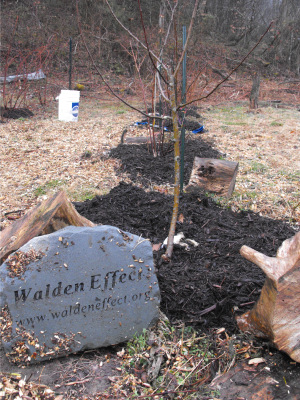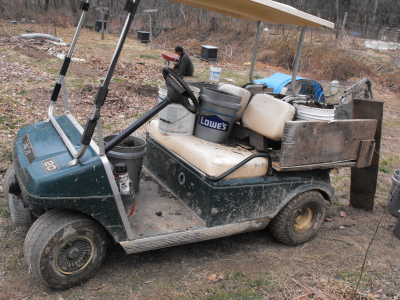
Cubic yards
 With the driveway finally dry enough to drive
over, Mark spent most of his time this week hauling
in load after load of soil amendments. In the process, I've
been learning to visualize a much larger unit of measurement than I'm
used to --- a cubic yard. Obviously, a cubic yard is a volume
that's three feet on each side, equal to 27 cubic feet. That's
equivalent to about 40 five gallon buckets, or half of Joey's pickup
truck bed.
With the driveway finally dry enough to drive
over, Mark spent most of his time this week hauling
in load after load of soil amendments. In the process, I've
been learning to visualize a much larger unit of measurement than I'm
used to --- a cubic yard. Obviously, a cubic yard is a volume
that's three feet on each side, equal to 27 cubic feet. That's
equivalent to about 40 five gallon buckets, or half of Joey's pickup
truck bed.
By my estimate, we
netted two cubic yards of wood chips during our chipper
rental weekend, for a cost of about $33 per cubic yard (not
counting our time and gas.) Ten pounds of King
Stropharia spawn used up a full cubic yard of those fresh chips,
with the other cubic yard set aside for later.
On his way home, Mark bought two
cubic yards of well composted wood mulch, for a cost of $24 per
cubic yard. The mulch covered the ground around a dozen
blueberries, eight grapes, and about seventy linear feet of
blackberries and raspberries. The seemingly huge amount of mulch
was perhaps a third of what I use on my woody perennials each year (and
maybe a tenth of what I could easily put to use if I had an unlimited
supply.)
 When I sent Mark over to the neighbors' to shovel up some
of their horse manure, I decided to translate the five gallon
buckets into cubic yards for comparison. He filled up the truck
with twenty buckets of well composted manure, which is about half a
cubic yard. That scantily covered twenty garden beds.
In fact, I put the manure into the garden nearly as fast as Mark could haul it
in to me, and figure I will need at least 5 cubic yards of
compost/manure to feed the vegetable garden this year (and could use
twice that much or more without overfertilizing.)
When I sent Mark over to the neighbors' to shovel up some
of their horse manure, I decided to translate the five gallon
buckets into cubic yards for comparison. He filled up the truck
with twenty buckets of well composted manure, which is about half a
cubic yard. That scantily covered twenty garden beds.
In fact, I put the manure into the garden nearly as fast as Mark could haul it
in to me, and figure I will need at least 5 cubic yards of
compost/manure to feed the vegetable garden this year (and could use
twice that much or more without overfertilizing.)
I'm not quite sure where
I'm going with this thought, except to say that I really like soil
amendments, and I could use many, many cubic yards of them. I
guess I just like to keep track so that we can work up to providing all
of the mulch and compost our farm needs.
Want more in-depth information? Browse through our books.
Or explore more posts by date or by subject.
About us: Anna Hess and Mark Hamilton spent over a decade living self-sufficiently in the mountains of Virginia before moving north to start over from scratch in the foothills of Ohio. They've experimented with permaculture, no-till gardening, trailersteading, home-based microbusinesses and much more, writing about their adventures in both blogs and books.
Want to be notified when new comments are posted on this page? Click on the RSS button after you add a comment to subscribe to the comment feed, or simply check the box beside "email replies to me" while writing your comment.

Good plan about letting Mark win from time-to-time. I think they need that to keep motivated.
I like your Walden Effect sign.
To me the difference seems like either carrying around buckets of raw sewage to the pit or taking buckets of compost from the toilet and carry them into the garden.
Methinks I'd prefer the latter, because it seems like a much less crappy job (pardon the pun).
Wouldn't it be nice to have a place where you can hang your roll of toilet paper? And a cover to keep flies out in the summer? It also helps prevent rain from flushing out undecomposed waste into the ground water!
If the pit is full, you can dig the next one and wheel the outhouse over it.